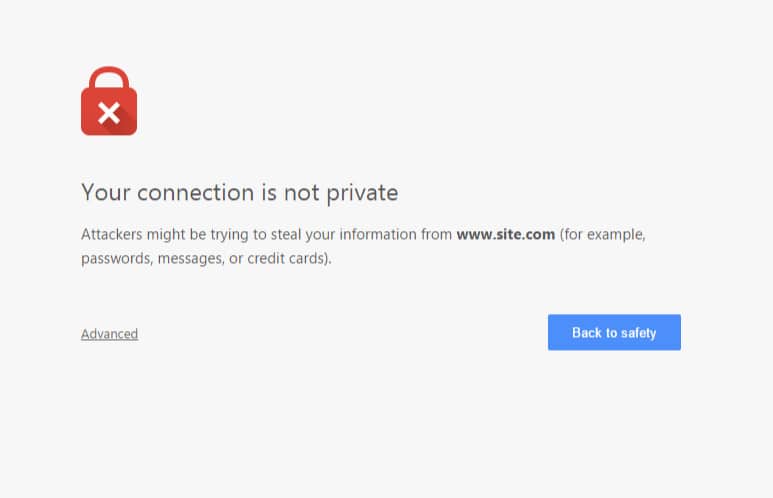As part of our commitment to enabling marketers to Do More With Less, Worry Free, the Solutions Engineering team at TUNE is always looking for ways to help our customers. Keeping users informed about the latest advancements in data protection and privacy is just one example of how they do that. In this post, team member Alon Bresky explains the technology behind SSL certificates, why you should use them, and how they are handled in the TUNE platform.
Affiliates and partner marketers around the world were surprised when, in July 2018, they were suddenly unable to log in to their websites on Google Chrome. The reason? They had received this notification claiming that their website was unsecured:

A screenshot of the unsecured connection alert that began appearing in July 2018 for certain websites on Google Chrome. Source: Google Chrome
The performance marketing industry had been expecting something like this to happen, so it was not a complete shock when it did in 2018. However, it still caught many websites and businesses off guard. In today’s reality of data breaches and consumer privacy concerns, having a secured website connection is a must. In this post, I will explain why and present a solution for establishing a secure network connection via SSL certification.
What Is SSL? What Is an SSL Certificate?
Secure sockets layer, or SSL, is a standard security technology for establishing an encrypted link between a server and a client, typically a web server (website) and a web browser, or a mail server and a mail client (e.g., Outlook).
Typically, data sent between web browsers and web servers is transmitted in plain text — leaving users vulnerable to digital eavesdropping. This data can be anything, from a mailing address in a form, to credit card numbers on a check-out page, to years of emails and saved documents. If an attacker intercepts this data as it passes through an unsecured connection, they can collect and use that information.
SSL, on the other hand, encrypts this data, allowing sensitive information to be transmitted securely. When a browser connects to a website secured by SSL, the browser checks for proof that it is secure, which is provided by an SSL certificate hosted by the web server. If the browser verifies the SSL certificate is authentic, the server and the browser establish a private connection. The website and browser then use shared cryptographic keys to encrypt information sent between them, check the integrity of the data sent, and authenticate the identity of the transmitting party.
The easiest way to tell if a website is secure is by looking in the URL. If you see “https” instead of “http,” your connection is private — the “s” stands for “secure.”
TUNE provides customers a free default SSL for the default domains go2cloud.org and hasoffers.com (our old brand name). For TUNE customers using a custom domain, an SSL certificate needs to be purchased separately. Although custom domains and SSL certificates are not necessary for platform functionality, they are still important to protect digital data and personally identifying information in marketing platforms.
Why Your Website Needs SSL
1. SSL Protects Your Data
The primary function of SSL is to protect the data transferred between a user and a server. When you put an SSL certificate on your website, every piece of information is encrypted and secured. The data is locked, and it can only be unlocked by the intended recipient (browser or server), as no one else can access the key to open it. While dealing with sensitive data like personally identifiable information, passwords, and credit card numbers, SSL usage helps to protect this data against hackers and skimmers. When a website is using unsurpassable encryption technology via SSL certificates, it is nearly impossible to steal protected data.
2. SSL Improves Customer Trust
When your customers see a green lock icon or a green bar in their browser URL field, they know that your company cares about data privacy and security. By using SSL, you are telling the world that all of the data your website sends and receives will be secured. If a user understands that you are a legitimate entity, they will be far more likely to do business with your company.
3. SSL Provides Authentication
An SSL certificate is more than just encryption — it’s authentication. This means you can be sure that you are sending information to the right server and not to some hacker trying to steal your information. Why is this important? The nature of the internet means that your customers are likely to send information through several computers. Any of these computers could pretend to be your website and trick your users into divulging personal information. The only way to avoid this risk is to get an SSL certificate from a trusted SSL provider. At TUNE, we provide certificates that are issued by Amazon, which is one of the largest and most reliable service providers in the world.
4. SSL is Browser-Friendly
In 2018, Google essentially made SSL mandatory in the Chrome browser. Today, every website that is not using an SSL/TLS certificate is flagged by Chrome as an unsafe website, and visitors to these websites must manually approve that they agree to open them. After Google released this feature in July 2018, many browsers, including Firefox, Safari, and Microsoft Edge, implemented the same policy regarding unsecured websites. With growing public demand for better user privacy and data security, it seems likely this trend will continue, leading browsers to eventually block all websites without SSL.
In Closing
Today, it doesn’t matter what kind of online business you have; SSL is essential for every website. That includes personal blogs, online stores, and SaaS platforms like TUNE. Without an SSL certificate to provide data protection and privacy, you risk scaring away new visitors and losing customer trust. Why take the chance?
If you are a TUNE customer and would like to add SSL to your custom domain, please contact your dedicated customer success manager or reach out to [email protected].
To learn more about the TUNE Partner Marketing Platform, drop us a note at [email protected], or start exploring the platform today when you request a demo or a trial.
Author
Becky is the Senior Content Marketing Manager at TUNE. Before TUNE, she handled content strategy and marketing communications at several tech startups in the Bay Area. Becky received her bachelor's degree in English from Wake Forest University. After a decade in San Francisco and Seattle, she has returned home to Charleston, SC, where you can find her strolling through Hampton Park with her pup and enjoying the simple things between adventures with friends and family.




Leave a Reply
You must be logged in to post a comment.